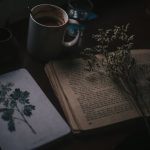Puisque les plus heureux ont des douleurs sans nombre,
Puisque le sol est froid, puisque les cieux sont lourds,
Puisque l’homme ici-bas promène son cœur sombre
Parmi les vains regrets et les courtes amours,Que faire de la vie? O notre âme immortelle,
Où jeter tes désirs et tes élans secrets ?
Tu voudrais posséder, mais ici tout chancelle ;
Tu veux aimer toujours, mais la tombe est si près!Le meilleur est encore en quelque étude austère
De s’enfermer, ainsi qu’en un monde enchanté,
Et dans l’art bien aimé de contempler sur terre,
Sous un de ses aspects, l’éternelle beauté.Artiste au front serein, vous l’avez su comprendre,
Vous qu’entre tous les arts le plus doux captiva,
Qui l’entourez de foi, de culte, d’amour tendre,
Lorsque la foi, le culte et l’amour, tout s’en va.Ah! tandis que pour nous, qui tombons de faiblesse
Et manquons de flambeau dans l’ombre de nos jours,
Chaque pas a sa ronce où notre pied se blesse,
Dans votre frais sentier marchez, marchez toujours.Marchez! pour que le ciel vous aime et vous sourie,
Pour y songer vous-même avec un saint plaisir,
Et tromper, le cœur plein de votre idolâtrie,
L’éternelle douleur et l’immense désir.
My Translation — ‘To a female artist’
Since the happiest have numberless pains,
Since the ground is cold, since the heavens are heavy,
Since the man down here walks his dark heart
Among the vain regrets and short-lived loves,
What to do with life? O our immortal soul,
Where will you throw your desires and your secret impulses?
You would like to possess, but here everything totters;
You want to love forever, but the grave is so near!
The best thing is still to shut oneself in
Some austere study, as well as in an enchanted world,
And, in beloved art, to contemplate on earth
One of its aspects, eternal beauty.
Serene-browed artist, you have understood,
You who, of all the arts, captured the sweetest one,
Who surrounded it with faith, with worship, with tender love,
Whilst faith, worship and love, all disappear.
Ah! Whereas for us, who fall from weakness
And lack a torch in the shadow of our days,
Each step has its bramble where our foot gets wounded,
On your fresh pathway walk, walk forever.
Walk! So that heaven will love you and smile upon you,
So that you may dream for yourself with a holy pleasure,
And deceive, heart full of your devotion,
The eternal pain and the infinite desire.
I thought I would do another translation for today; I haven’t done one in a while. This is a poem that I really like by Louise Ackermann. This poet was born in Paris in 1813, and spent a lonely childhood in the countryside near Amiens. She married a German man called Paul Ackermann, and moved to Berlin with him, but her husband died after only two years of marriage. Once widowed, Louise Ackermann moved back to Nice to live with her sister in a very austere fashion. She lived in isolation in the countryside, and it was during this time of solitude that she wrote most of her poetry. She published at three volumes of poetry (as far as I know) during her lifetime.
I find this poem quite fascinating in its exploration of the nature of art and the artist. It seems to me that there is a great sadness and longing in this verse — a longing for the eternal beauty that seems to exist in art. In this poem there is an acknowledgement of the drudgery of human life (the “numberless pains”, the “vain regrets” and “short-lived loves”), as well as an expression of the human impulse to express the soul in art (“O immortal soul,/ Where will you throw your desires and your secret impulses?”) There is also an expression of the idea of wanting to exist as if in art (similar ideas to those of Keats’ Ode on a Grecian Urn) — “You want to love forever, but the grave is so near!” The artist keeps almost flying away with her art, but she is always pulled back to reality…
I love the final line, that “eternal pain and infinite desire”. I think it is such a profound description of the nature of the artist (and poet) — forever in pain, forever suffering from being human, but forever full of desire to express, to create, to transcend… to attain something holy through art.
I found this quite a difficult poem to translate, and this is what I came up with.
Reviewed by Emily Ardagh



